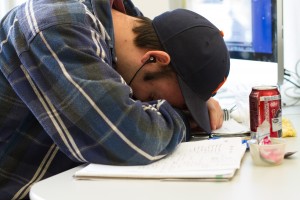
All-night study sessions may seem like the only way to get through stressful school weeks, but sleep deprivation will only hurt students’ chances of getting better grades.
“Sleep deprivation causes the production of stress hormones, such as adrenaline,” said Maureen Rice, Ph.D., a counselor for Counseling and Psychological Services. “And if one does so frequently it can lead to being unproductive, where memorization and concentration are impaired.”
Some long-terms effects of consistent sleep-deprivation can lead to some of the same effects of insomnia, which include a decrease in energy, memory and concentration problems, depression and anxiety, Rice said. Academic performance and critical thinking can also decrease with lack of sleep.
Pulling an all-nighter is not the best option for students trying to perform well in school. Students can avoid all-nighters with some planning ahead and time management strategies.
Rice said students should take time to relax while they are doing school work in order help manage stress levels.
“Try to decrease school stress and worry by doing deep breathing for several minutes each hour to lesson the flight or fight responses triggered by stress,” Rice said. “Diaphragmatic breathing teaches one to calm down quickly and easily, improves mental clarity, concentration and memory, to help one achieve peak performance.”
Some students find that missing sleep is the only way they can catch up on all of their assignments. Brady McCarthy, a junior from Bluffdale, pulled one all-nighter per week four weeks in a row during the summer term.
“We had to do one paper a week in my class,” said McCarthy, a Middle East and Arabic Studies major. “In order to be motivated I’d stay up and not sleep until it was done. And usually it wasn’t done until I was up all night.”
McCarthy kept himself awake using caffeinated energy drinks and sodas, sunflower seeds and midnight bike rides. McCarthy saw the effects his all-nighters had on his performance the next day.
“The next day is pretty horrible,” McCarthy said. “I was so lethargic I couldn’t do anything. I would go to class, but I was drained.”
Dr. Phillip Alapat, a medical director at the Harris Health Sleep Disorders Center, spoke to “News Medical” about the risks and dangers resulting from all-night study sessions.
“Any prolonged sleep deprivation will affect your mood, energy level and ability to focus, concentrate and learn, which directly affects your academic performance,” Alapat said.
Alapat suggested getting between eight and nine hours of sleep per night and studying between the times of optimal brain functioning, 6 to 8 p.m.
The negative consequences associated with sleep deprivation are ultimately more harmful than helpful when it comes to the final grade, and students should take precautions to avoid all-nighters during the school year.




